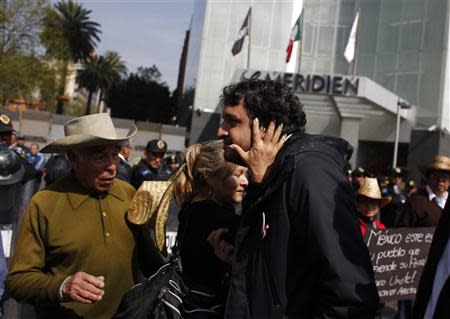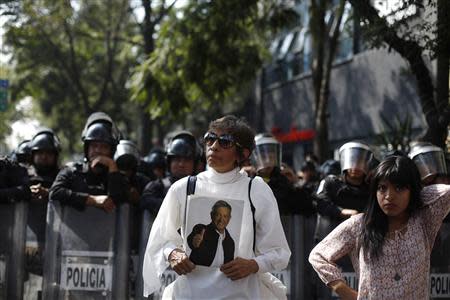Mexico lawmakers preparing to debate energy reform: top senator
By Miguel Gutierrez and Adriana Barrera MEXICO CITY (Reuters) - Mexican lawmakers will send a landmark energy bill to Senate committees on Thursday to pave the way for debate on a cornerstone of President Enrique Pena Nieto's economic reform drive, a top ruling party lawmaker said on Wednesday. The bill, which would open Mexico's state-dominated energy sector to private investment in a bid to raise flagging oil output, will need approval of the Senate and lower house of Congress. Lawmakers have been negotiating the fine print of the reform, which will determine how far-reaching it will be. Supporters say it is needed to raise slowing growth in Mexico, Latin America's second-largest economy. Opponents call the reform a de facto privatization of national assets. David Penchyna, leader of the Senate's energy committee and a member of Pena Nieto's Institutional Revolutionary Party (PRI), said the bill would be submitted to Senate committees on Thursday, but that the committees would not vote on it until Friday at the earliest. Penchyna said the committees would on Thursday settle on a plan for debating the bill. Once approved by the committees, the bill must then be approved by both houses of Congress. "We are very close to finishing drawing up the bill to be able to present it ... not just the changes that will be proposed, but also a presentation of the reasons," Penchyna told reporters. His comments come after Mexico's Senate passed an electoral reform demanded by the opposition early on Wednesday, the last major obstacle to pushing on with the energy bill. The electoral bill, would allow lawmakers to serve consecutive terms in office and curb the power of the presidency, still must be voted on by the lower house. Police erected metal barriers around the Senate on Wednesday as several hundred protesters, including children, demonstrated peacefully against the energy reform. On Tuesday, prominent leftist Andres Manuel Lopez Obrador was rushed to hospital for surgery after suffering a heart attack, reducing the likelihood that he will be able to lead street protests against the energy plans. However, his son called on supporters to push ahead with plans to form a human circle around Congress. Lopez Obrador, a former mayor of Mexico City, was runner-up to Pena Nieto in last year's presidential election and is perceived as one of the biggest threats to energy reform. The leftist Party of the Democratic Revolution (PRD), which opposes opening the oil sector to private investors, withdrew from a cross-party pact last week, raising chances PRI lawmakers and conservatives will pass a far-reaching energy reform. PAN PRESSURE The PAN has made its support for the energy overhaul conditional on passage of the electoral reform. To reverse almost a decade of declining crude output, Pena Nieto wants to open up the state-controlled oil sector to allow private investors to team up with oil monopoly Pemex and share in profits from exploration and production. The PAN, which is the PRI's natural ally on the energy revamp, is pushing for more lucrative contracts to be offered, such as concessions, and lawmakers say they are exploring options for bigger changes. "I can tell you in that if the text does not include instruments (beyond profit-sharing), the PAN will not vote for it," PAN congressman Juan Bueno told Reuters. "Companies don't like profit-sharing contracts and neither do we." "Nor will the PAN support it if there is no mechanism that states that oil income is destined for a sovereign oil fund." Long the dominant force in Mexican politics, the PRI lacks a majority in Congress and needs PAN support to pass the energy bill, which is expected to happen later this month. Senior officials in the PRI have signaled the party is willing to consider a broader energy reform. That could include production-sharing contracts that will pose a bigger political challenge in the face of massive public protests the left has pledged to stage against the reform. Mexico has the biggest proven oil reserves in Latin America after Venezuela and Brazil, at nearly 14 billion barrels. It also has shale-gas resources that might be as high as 460 trillion cubic feet, according to Pemex data. But Mexico's crude output has fallen by a quarter since peaking at 3.4 million barrels per day in 2004. The reform as originally proposed in August falls short of rules in oil-producing peers such as Brazil, Colombia and Norway that allow companies to keep a share of output. (With reporting by David Alire Garcia, Alexandra Alper and Michael O'Boyle; Writing by Simon Gardner; Editing by Vicki Allen, Andrew Hay and Cynthia Osterman)




